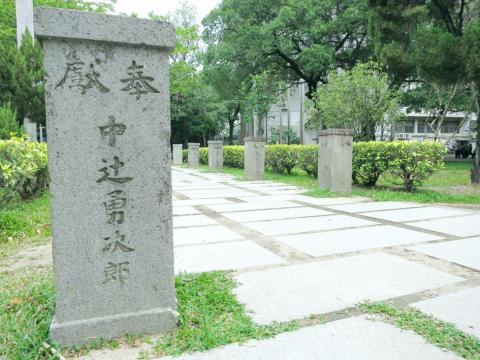The Taichung City Government yesterday urged Legislative Deputy Speaker Hung Hsiu-chu (洪秀柱) to refrain from politicizing cultural and historic issues, following Hung’s criticism of the city government’s plan to repair a collapsed torii in the city.
A torii is a structure marking the entrance to a traditional Japanese Shinto shrine, with two vertical poles and a horizontal beam across the top.
In response to Taichung Mayor Lin Chia-lung’s (林佳龍) announcement that the city government plans to renovate Taichung Park (台中公園), where the torii is located, to recover the city’s “past glory,” and “historical identity,” Hung said on Facebook that the move praises the nation’s colonial rulers and “twists cultural identity.”

Photo: Loa Iok-sin, Taipei Times
“The torii of the [former] Shinto shrine is a symbol of how the Japanese colonial rulers tried to forcibly destroy Taiwanese traditions; it is a humiliating reminder of colonialism, and represents no Taiwanese identity and spirit,” Hung said. “If there is any historical resonance to it, what is it other than the pain Taiwan had to suffer once it became a colony? If there is historical identity, what is there besides Japanized identity? How could our local government head so brutally castrate our so-called ‘historical identity,’ praise the colonialists and call it ‘past glory?’”
Taichung City Information Bureau Director-General Cho Kuan-ting (卓冠廷) disagreed with Hung, saying that the torii could enrich the cultural landscape of the park.
“Our project is not only about repairing the torii, the plan is to renovate Taichung park, and repair all the attractions and buildings in the park — including the Taichung Park Pavilion, the North Gate, Zhongzheng Bridge and the night watch tower — and make all of them cultural landmarks in the city,” Cho said. “Repairing the Torii has nothing to do with the debate over cultural identity, it is about respecting history, and allowing cultural diversity in this country.”
Built in 1908, Taichung Park is the oldest park in the city and the twin pavilion standing in the middle of the park’s lake is often described as a symbol of the city.
In the colonial period, there was a Japanese Shinto shrine called Taichu Jinja in the park.
After the Japanese surrender in 1945, the incoming Chinese Nationalist Party (KMT) regime tore down the main building of the shrine, but the remains of the torn-down torii have been left lying in the park.

ANOTHER EMERGES: The CWA yesterday said this year’s fourth storm of the typhoon season had formed in the South China Sea, but was not expected to affect Taiwan Tropical Storm Gaemi has intensified slightly as it heads toward Taiwan, where it is expected to affect the country in the coming days, the Central Weather Administration (CWA) said yesterday. As of 8am yesterday, the 120km-radius storm was 800km southeast of Oluanpi (鵝鑾鼻), Taiwan’s southernmost tip, moving at 9kph northwest, the agency said. A sea warning for Gaemi could be issued tonight at the earliest, it said, adding that the storm is projected to be closest to Taiwan on Wednesday or Thursday. Gaemi’s potential effect on Taiwan remains unclear, as that would depend on its direction, radius and intensity, forecasters said. Former Weather Forecast

As COVID-19 cases in Japan have been increasing for 10 consecutive weeks, people should get vaccinated before visiting the nation, the Centers for Disease Control (CDC) said. The centers reported 773 hospitalizations and 124 deaths related to COVID-19 in Taiwan last week. CDC Epidemic Intelligence Center Director Guo Hung-wei (郭宏偉) on Tuesday said the number of weekly COVID-19 cases reported in Japan has been increasing since mid-May and surpassed 55,000 cases from July 8 to July 14. The average number of COVID-19 patients at Japan’s healthcare facilities that week was also 1.39 times that of the week before and KP.3 is the dominant

The Chinese Communist Party’s (CCP) working group for Taiwan-related policies is likely to be upgraded to a committee-level body, a report commissioned by the Mainland Affairs Council (MAC) said. As Chinese President Xi Jinping (習近平) is increasingly likely to upgrade the CCP’s Central Leading Group for Taiwan Affairs, Taiwanese authorities should prepare by researching Xi and the CCP, the report said. At the third plenary session of the 20th Central Committee of the CCP, which ended on Thursday last week, the party set a target of 2029 for the completion of some tasks, meaning that Xi is likely preparing to

US-CHINA TRADE DISPUTE: Despite Beijing’s offer of preferential treatment, the lure of China has dimmed as Taiwanese and international investors move out Japan and the US have become the favored destinations for Taiwanese graduates as China’s attraction has waned over the years, the Ministry of Labor said. According to the ministry’s latest income and employment advisory published this month, 3,215 Taiwanese university graduates from the class of 2020 went to Japan, surpassing for the first time the 2,881 graduates who went to China. A total of 2,300 graduates from the class of 2021 went to the US, compared with the 2,262 who went to China, the document showed. The trend continued for the class of 2023, of whom 1,460 went to Japan, 1,334 went to